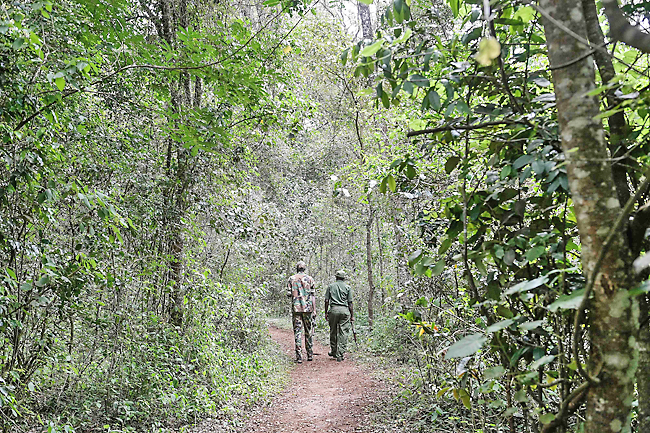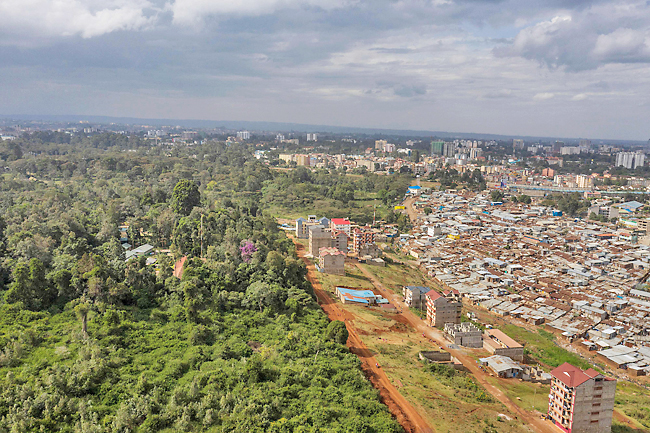NAIROBI (AFP) – In his 15 years defending one of Nairobi’s last green spaces, Simon Nganga has seen off brazen attempts to seize what’s left of the lush forest bordered by highways and housing estates.
Persistent efforts by developers and powerful individuals to seize chunks of the bush as their own were defeated under historic laws enacted to protect Kenya’s dwindling forests from unchecked logging and environmental destruction.
But a proposal expected before Parliament seeks a major change to these protections, by allowing politicians to determine if public forest can be carved out and handed over to private interests.
Under the contentious amendment, anyone wishing to alter forest boundaries to claim ownership of land could lobby Parliament directly, bypassing approval from the Kenya Forest Service (KFS), which is currently mandated to scrutinise such bids.
“If it goes through… that will open a Pandora’s Box,” Nganga told AFP beneath the canopy of Ngong Road Forest, a 1,224-hectare tract of indigenous woodland inhabited by bush bucks, Sykes monkeys and over 100 species of birds.


“Everyone will want a piece of the forest, which is very dangerous for our forests, and our future.”
The amendment to the Forest Conservation and Management Act – reforms passed after decades of rampant land clearing – has been opposed by the Environment Ministry and the KFS, and roused significant community anger.
It has also drawn rare criticism from the United Nations (UN), which headquarters its environment programme in Nairobi, and is just weeks away from staging the world’s highest-level decision-making assembly on nature and biodiversity in the Kenyan capital.
ENVIRONMENTALISTS BLINDSIDED
The amendment argues that granting KFS primary authority over hearing and ruling on changes to forest boundaries “unnecessarily limits the right of any person to petition Parliament” as granted under the constitution.
Environmentalists were blindsided by the proposal, which they said would shift power over Kenya’s forests from a dedicated government agency with a record of fighting land theft, to political elites trying to win a bitterly-contested election.
“Why do Members of Parliament want to condemn Kenya and the world to an unbearably hot future by weakening the Forest Act?” said conservation group Nature Kenya.
Nganga said the forest laws proved a bulwark against encroachment – since first passing in 2005, no land within Ngong Road Forest had been legally hived off, keeping its boundary firmly intact.
It is a remarkable achievement for an urban forest pressed in on all sides by one of Africa’s fastest-growing cities, but it still bears the scars of battles won and lost.
A major highway slices through its interior, one unfenced side opens onto the vast Kibera slum, while forest doled out years ago to connected elites saw trees razed for apartments.
But it survived as a whole only because strong laws had kept land grabbers at bay, said Nganga, vice chairman of the Ngong Road Forest Association.
“It has been a success,” Nganga said at the forest edge overlooking Kibera, where men walked by carrying trees they felled for firewood.
“We cannot talk about winding back success. We know what happened before the Act, when individuals could give out land. We don’t want to get back there.”
‘WE’LL LOSE EVERYTHING’
Parliament is considering the amendment as Nairobi this month prepares to host the UN Environment Assembly, where countries will be asked to commit to stronger protections
for biodiversity.
In a letter to Parliament, a top UN official in Nairobi warned the proposed changes threatened Kenya’s reputation and undermined its efforts to expand forest cover and tackle climate change.
“Unfortunately, we believe the proposed amendment takes us in a contrary direction, incompatible with Kenya’s laudable commitments and trajectory hitherto,” resident coordinator Stephen Jackson wrote in a letter seen by AFP.
Kenyan Environment Minister Keriako Tobiko said his office learnt about the amendment through the press and regretted it had caused “panic and doubt in the international community”.
Land is extremely contentious in Kenya, and disputes over ownership can turn violent.
Environmental activist Joannah Stutchbury was shot dead outside her home in Nairobi in July 2021 after spearheading a vocal campaign to protect a forest near the city from developers.
The timing of this bill in a closely-fought election year also raised eyebrows.
Electoral cycles often spelled destruction for forests as land is promised to communities and political allies in exchange for votes, conservation group Wildlife Direct head Paula Kahumbu said.
“Forests have always been up for grabs when it comes to elections,” she told AFP.
“It is kind of like the bribe that is not cash.”
Nganga fought for the forest before, and knows what is at stake now.
“We will lose everything,” he said.







